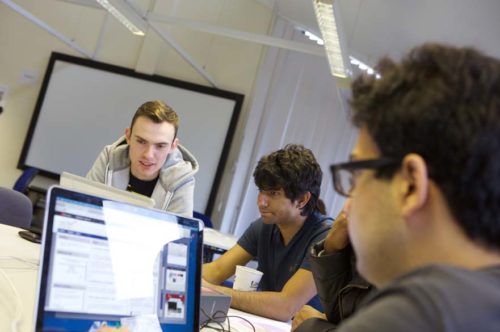Overview
This degree programme will equip graduates who are capable of meeting the increasing demands for combining Computer Networks, Security, and Programming expertise raised by the growing adoption of the Next-Generation Network (NGN) services, e.g., VoIP, and Next Generation Network Model, i.e., SDN and NFV, where network devices have turned to be a programmable virtual entity on the cloud.
Beside core computer science and cyber security modules, this course includes key networking modules prepared carefully according to the new Cisco certification path, in consultation with our Cisco partner. These new modules focus on industry level requirements and are certification oriented and will prepare graduates to meet the new skill demands to maximise employability.
The structure of the course and programme modules makes it possible for graduates to also take traditional and emerging Computer Science, Software Engineering, or Cyber Security roles.
Key features
- You will join Cisco Networking Academy.
- Covering the syllabus of three Cisco certificates: The new Cisco Certified Network Associate, Cisco CyberOps Associate, and Cisco DevNet Associate and one additional Cisco Networking Academy course: Network Security
- Specialist networking lab facilities, built according to Cisco latest recommendations.
- Free Cisco assessment for related modules to gain a Course Completion Certificate/Digital Badge from Cisco Networking Academy verifying the acquired skills and preparing the students to optionally obtain the commercial certifications at a 3rd party exam centre.
- This course is taught by experts from DMU’s Cyber Technology Institute, which boasts an international reputation in cyber security, influencing the approach taken by the UK government and leading organisations.
- DMU has been named a gold standard ‘Academic Centre of Excellence in Cyber Security Education’ by the leading authority on cyber security in the UK, the National Cyber Security Centre (NCSC) – part of GCHQ. DMU is the first university in the East Midlands to achieve this prestigious status.
- DMU has been recognised for conducting world-leading cyber security research, having been named the East Midlands’ first ‘Academic Centre of Excellence in Cyber Security Research’.
- Gain valuable industry experience by undertaking a placement, with students taking up placements at Airbus, GCHQ, and Vauxhall Motors.
- Our DMU Global programme offers students the opportunity to have a valuable international experience as part of their studies. Cyber Security students recently gained insights into San Francisco’s tech industry, while others put their skills to the test at New York’s Spyscap museum.
Entry criteria
- A typical offer is 112 UCAS points from at least two A-levels or equivalent or
- BTEC National Diploma/ Extended Diploma at DMM
Plus five GCSEs at grade 4 or above, including English and Mathematics or equivalent.
Alternative qualifications include:
- Pass in the QAA accredited Access to HE. English and Mathematics GCSE required as a separate qualification as equivalency is not accepted within the Access qualification.
We will normally require students to have had a break from full-time education before undertaking the Access course or
- International Baccalaureate: 26+ points
- Foundation Year in Computing: Pass Foundation, and progression is at the discretion of the programme leader. Refer to the Foundation team for further guidance.
Course modules
First year
- C Programming I
- Computer Ethics
- Computer Systems
- Mathematics for Computing
- C Programming II
- Computer Law and Cyber Security
- Introduction to Networks (ITN)
- Database Design and Implementation
Second year
- Programming for Network Engineers
- Web Application Development
- Switching, Routing, and Wireless Essentials
- Data Structures and Algorithms
- Research and Development Skills
- Penetration Testing
- Enterprise Networking, Security, and Automation
- Cryptography
Third year
- Development Project
- Cybersecurity Operations
- Network Development
- Multimedia Networking
- Network Security
- Emerging Technology in Computer Networks
Optional Module
- Malware Analysis
or
- Network Forensics
Teaching and assessments
The course is part of DMU’s Cyber Security Centre, which influences the government and corporations in their approach to cyber security. This shapes the curriculum so that you learn what is important. It also grants you privileged access to career opportunities. In the first year, you will normally attend around 13–15 hours of timetabled taught sessions each week, split across a variety of lectures, small group activities and practical laboratory work.
Assessment is made up of roughly 25 per cent end-of-year examination and 75 per cent coursework in each year. The coursework takes a variety of forms, with frequent laboratory-based phase tests providing early feedback on progress. In the second year, more substantial assignments are set, including a research study. In the final year, assessment is typically by coursework with some specialist optional modules assessed by exams.
Zobacz więcej na stronie uniwersytetu >>
Wiza studencka do Wielkiej Brytanii
Aby studiować w Wielkiej Brytanii potrzebujesz wizy studenckiej. Aby złożyć wniosek o taką wizę studencką musisz zdjać certyfikat językowy na poziomie B2.
Uważaj! Do celów wizowych musisz wybrać wyłącznie egzamin w wesji Secure English Language Test (SELT) UKVI .
Co to jest test SELT UK VI registration? Przeczytaj więcej o testach SELT UKVI >>




















